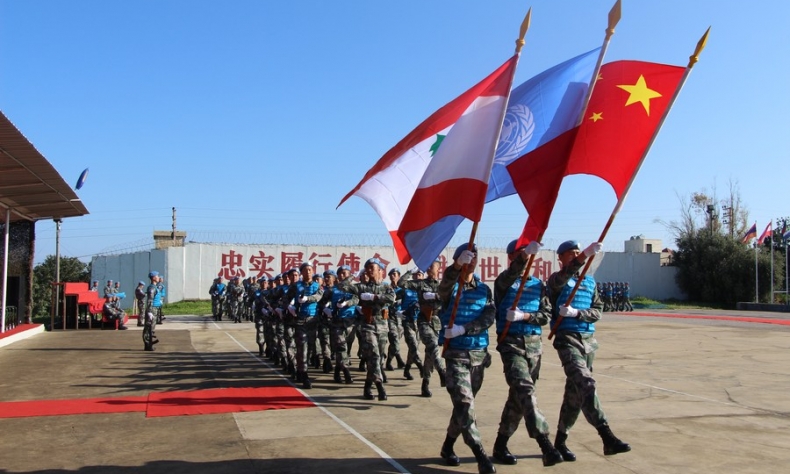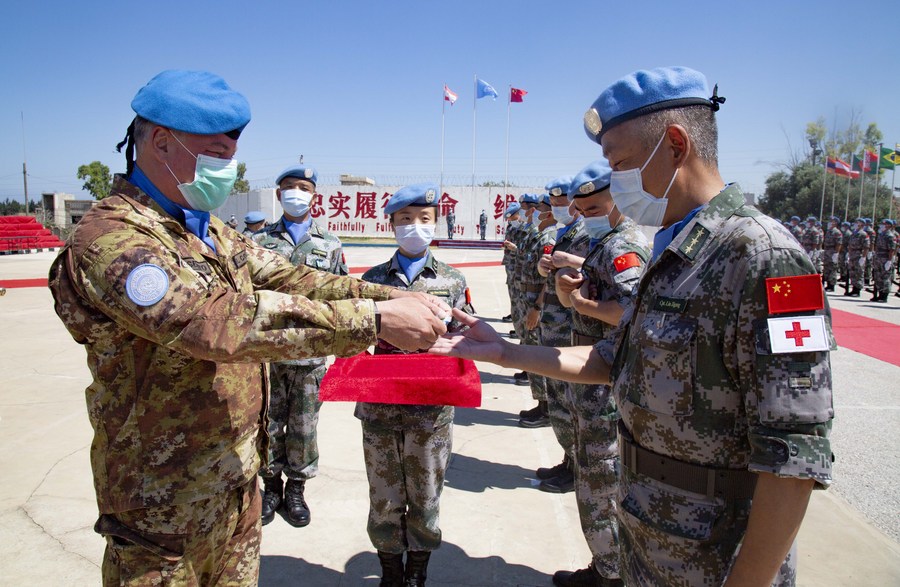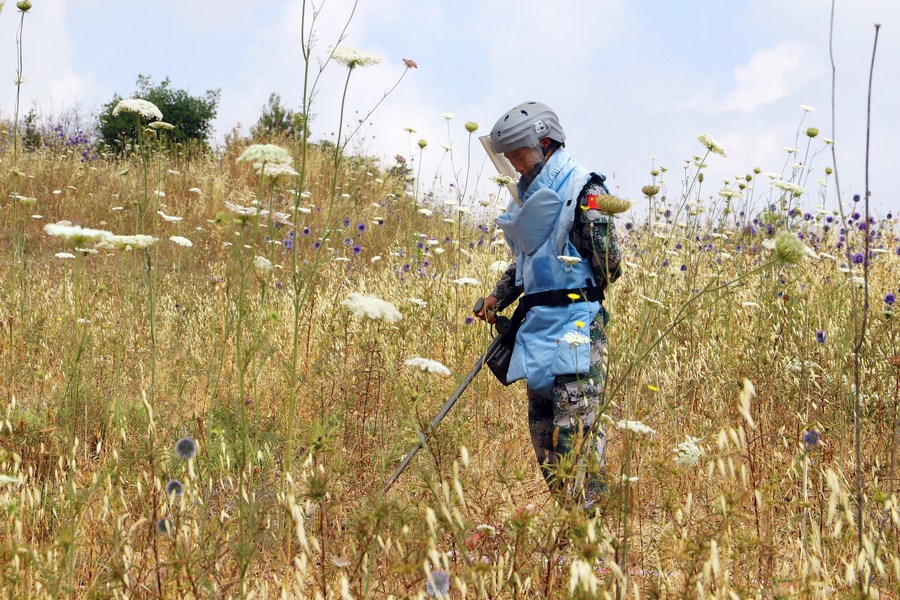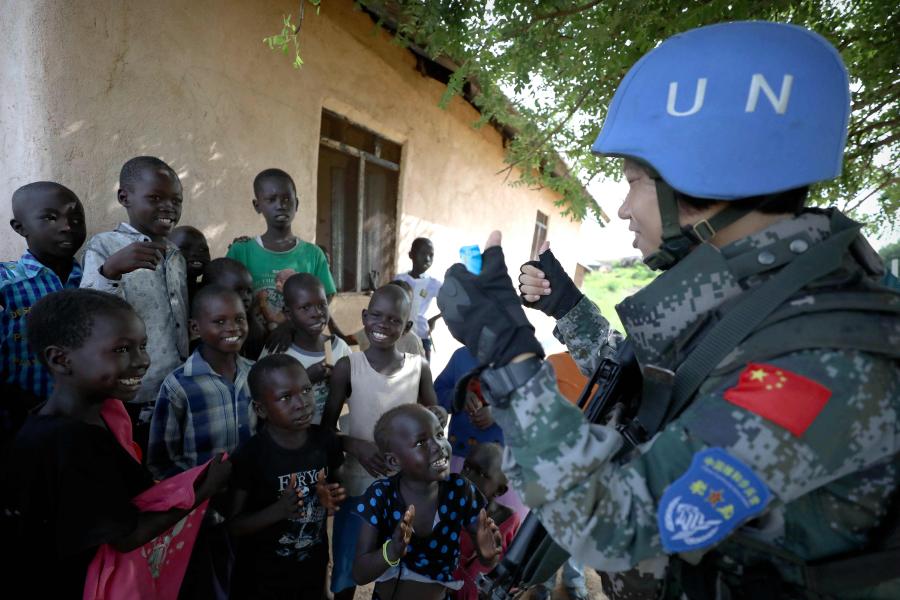New Dimensions of Peacekeeping

China’s contribution extends from being just a personnel and funding supplier.
The active involvement of China in UN peacekeeping operations in the past three decades has earned it the status of global peace provider. Ever since China first deployed troops to the UN’s blue helmets in 1990, when it sent five military observers to the Middle East, its commitment to serving the wellbeing of humanity through UN peacekeeping remains a key initiative showcasing the country’s soft power.
Peacekeeping has undeniably been an integral part of China’s endeavor in global multilateral commitment. This is demonstrated by its largest troop contribution to the UN peacekeeping force among the permanent members of the UN Security Council, with 50,000 peacekeepers on 25 missions. The China-UN Peace and Development Fund has provided $67.7 million for 80 projects related to peacekeeping operations since President Xi Jinping first announced the fund in 2015. China is now the second largest contributor to the UN peacekeeping budget.

Marching forward
Perhaps the peace-intent norms entrenched in China’s cultural DNA might not be well understood by those who advocate military intervention. Nonetheless, the Chinese perspective of peace-building, characterized by no military intervention as well as a respect for the host state’s territorial sovereignty, may provide a viable alternative model to the existing UN peacekeeping protocol. In this respect, China could take matters one step further by widening its horizons on peacekeeping, moving from a sheer troop and budget supplier to one contributing to normative change. After all, the prevailing protocol is not carved in stone, but instead should evolve with the times and the changing geopolitical landscape.
In reality, peacekeeping should no longer confine itself to preserving a superficial interim ceasefire in the conflict zone. More importantly, the essence of peacekeeping lies in the building of lasting post-conflict peace in the war-torn region. However, this might be a tall order to achieve without any political solution meeting the demands of all stakeholders. In this context, building a consensus through consultation and negotiation is the only viable avenue for the peace formula to work. No imposition of whims and fancies courtesy of any outside interventionist could ever result in lasting peace. Much less the condescending directives from the intervening party all set to bring the warring factions to their knees.

Under such circumstances, more often than not, the interests of the people—one of the key stakeholders—are not factored into the political settlement equation. This “convenient oversight” might incite instability that can rock the fragile peace brokered. To the proponents of human rights, is it not an outright breach of the people’s fundamental right to survival, if the peace brokers and peacekeepers were to turn a blind eye to the dire need for normalcy among those trapped in the throes of conflict? Their entitlement to post-conflict livelihood is as indisputable as any other human right, albeit different from those prioritized by liberal democracies in the West.
Particularly in the developing world, economic wellbeing reigns supreme as this is the only hope that can liberate a populace from conflict-induced deprivation. And this is only likely to spring from economic development intertwined with a nation’s resurrection from the ruins of turmoil. The centrality of economic wellbeing in peacekeeping should never be discounted.
Here, economic development supported by foreign or international aid only serves as a means to empower the host nation to feed its own population in the post-conflict era. As life returns to normal, with law and order restored, the next step is that of creating jobs. This would, from the Asian perspective, far outweigh the importance of ballot box democracy.
Higher goals
Despite the fact that economic development has time and again proven the key solution in several areas, notably in Africa where the Chinese have embarked on several peacekeeping operations, the West generally remains skeptical of the real motives behind China’s high-profile participation in UN peacekeeping. Some geopolitical narratives from the West were quick to jump to far-fetched conclusions by establishing the causal link between the rising Chinese involvement in peacekeeping over recent years and its economic interests worldwide. Once again, this is just another hypothetical presumption targeting China in the prevailing war of narratives amid an escalating geopolitical contest. In reality, the unfounded skepticism contributes nothing to peacekeeping, but merely lays bare a deep-seated prejudice rooted in either ignorance or a typical malicious bias against China.
Be that as it may, the unkind interpretation of the Chinese peacekeeping perspective does not deter the nation from taking on the role of a dutiful and responsible stakeholder in the international community. China walked the talk by adhering to the objectives and principles stipulated in the UN Charter. Its commitment to “the peaceful resolution of disputes or using the role of regional and subregional organizations in promoting partnership for peace” is clearly championed in the State Council Information Office’s white paper entitled China’s Armed Forces: 30 Years of UN Peacekeeping Operations, which was released in September 2020.

On this premise, China can be expected to expand its international role by extending more public good to the globalized community. A case in point is the nation’s ideal of forging a community with a shared future for humanity. This is a clarion call for the international community to coordinate a good fight in the face of various existential challenges that warrant multilateral cooperation and collective wisdom. Knowing that peacekeeping, and more specifically the creation of durable peace, has never been an easy feat, this supreme principle becomes even more challenging as it is an all-embracing human endeavor covering a myriad of initiatives, from economic collaboration to the concerted battle against existential challenges.
China has already manifested its global inclusiveness through extensive engagement and consultation in the implementation of the Belt and Road Initiative since 2013. Its underpinning principle of extensive consultation, joint contribution and shared benefits stands out as a shining testimonial of the nation’s commitment to all-inclusiveness. This is the desired building block of genuine multilateralism that many small and weak nations are yearning for in their pursuit of international cooperation.
The U.S. and its allies have no reason to turn this public good into a bogeyman under the enduring prism of prejudice. The increasing international presence of China—ranging from UN peacekeeping operations to the recent urgent dispatch of COVID-19 vaccines—may earn China its fair share of due influence and recognition in global diplomacy. Yet in its very essence, this is exactly China’s response to the developed West’s calls for China to take on a more pivotal role on the world stage.
While wary of China’s rise, and weary of trying to contain it, perhaps it might prove more constructive for the West to prepare to compete with China through the pursuit of excellence, on a level playing field. Genuine competition in contributing more public good to the cause of serving the interests of humanity may sound profound, if not Utopian, but certainly it is not beyond our reach. It is merely a matter of choice—to do or not to do.
The author is chairman of the Center for New Inclusive Asia.
 Facebook
Facebook
 Twitter
Twitter
 Linkedin
Linkedin
 Google +
Google +










